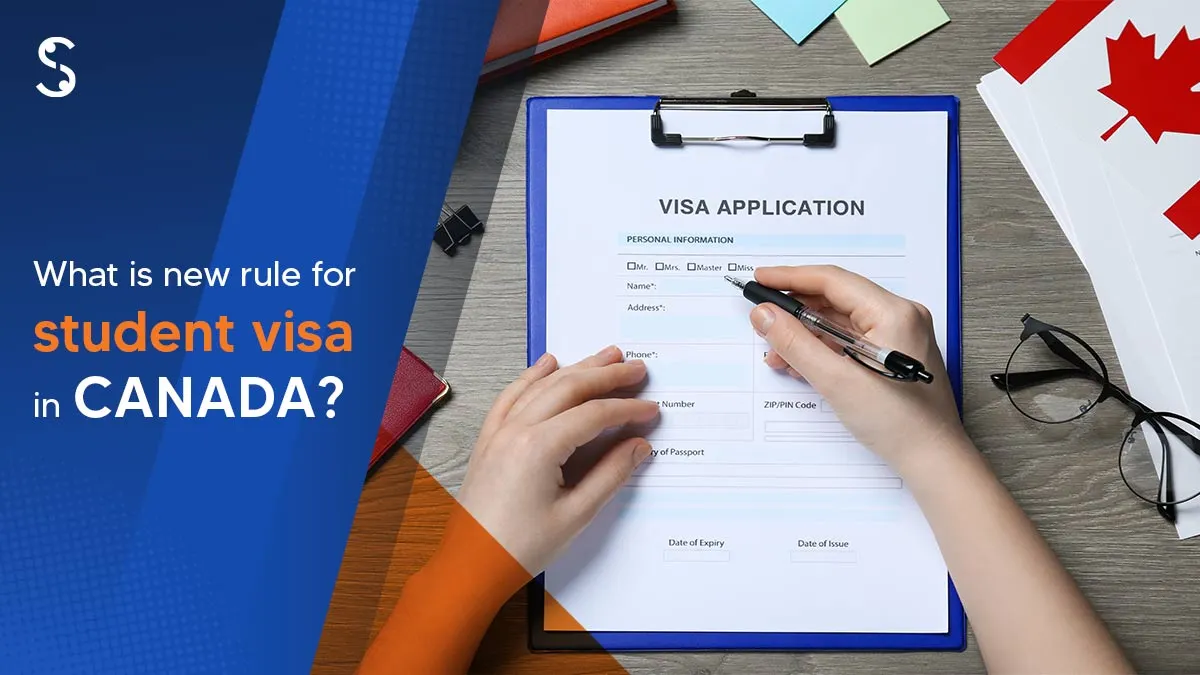
What is the New Rule for Student Visa in Canada?
Canada has long been a top choice for international students seeking high-quality education in a welcoming environment. However, starting in 2024, the government has implemented new rule for student visa in Canada, particularly in the study permit and post-graduate work Permit (PGWP) requirements.
These changes are set to have a significant impact on the student visa process and are important for prospective students to be aware of.
Here is the overview of the new rule for student visa in Canada:
- Temporary cap on student permits (down by approx. 35%)
- Changes to post graduation work permit (PGWP) eligibility criteria
- Extended PGWP for master’s graduates
- Increased cost of living requirement (from $10,000 to $20,635 CAD)
- Spousal Open Work Permit (SOWP) eligibility changes
Let’s understand about these changes in brief and what you need to know if you’re planning to study in Canada in 2024.
New Rules for Student Visa in Canada in 2026
1. Temporary Cap on Student Permits in 2026
Canada introduced a temporary cap on study permits in 2025 to address what they perceived as unsustainable growth in the international student population. This cap is expected to result in a 35% decrease (around 360,000) in the number of approved study permits compared to 2024.
The federal government has allocated quotas to each province and territory based on their population. Provinces with a larger international student population may see a steeper reduction (up to 50%). Each province will determine how to distribute their allocation among institutions.
Reasons for the Decrease:
- The Canadian government expressed concerns about the rapid increase in international students.
- The government wants to ensure international students receive the education they were promised. With a smaller applicant pool, they believe institutions can dedicate more attention to each student and provide a more enriching experience.
- Processing a vast number of applications can lead to backlogs and delays. The cap allows Immigration, Refugees and Citizenship Canada (IRCC) to streamline the application process.
The quota for 2025 remains undetermined because the government wants to assess the impact of the 2025 cap.
Here’s what you need to know if you’re planning to study in Canada in 2026:
- With fewer spots available, competition for study permits could intensify. Students with strong academic records and clear study plans might have a better chance.
- Provinces might prioritize study permits for programs that align with their labour market needs.
- Focusing on universities in provinces with less significant reductions in quotas might increase chances of acceptance.
2. Changes to Post Graduation Work Permit (PGWP) Eligibility
Canada’s changes to the Post-Graduation Work Permit (PGWP) program offer both good news and bad news for international students, depending on their program of study.
Extended PGWP for Master’s Graduates:
Previously, only Master’s programs lasting at least two years qualified for a PGWP. Now, graduates of all Master’s programs (minimum 8 months) are eligible to apply for a three-year PGWP, if they meet other eligibility criteria.
This benefits students who complete shorter Master’s programs (e.g., 12 months).
Curriculum Licensing Agreement Programs Lose PGWP Eligibility (Starting Sept 1, 2025):
If you’re planning to enroll in a program under a Curriculum Licensing Agreement (CLA), be aware that graduates of these programs will no longer be eligible for a PGWP after September 1, 2025.
These programs are typically offered in collaboration with a professional body and may not provide the broad work experience sought by the PGWP program.
Temporary Online Learning Measures Extended:
The temporary policy allowing online learning completed outside Canada to count towards PGWP eligibility has been extended until August 31, 2024. This is a relief for students who began their programs during the pandemic with significant online components.
3. Increased Cost of Living Requirement
The new rule for student visas in Canada is a significant increase in the cost-of-living requirement in 2024. Previously, international student visa applicants needed to demonstrate access to CAD $10,000 to cover living expenses for their first year.
Under the new rule, applicants need to show they have CAD $20,635, which is more than double the previous amount.
(It’s essential to note that the cost-of-living requirement is separate from tuition and travel expenses).
There’s also a slight variation for the province of Quebec. Students applying to study there will need to show access to CAD $15,078, with some exceptions for minors.
4. Spousal Open Work Permit (SOWP) Eligibility Changes
Canada recently tightened the eligibility requirements for Spousal Open Work Permits (SOWP) for spouses and partners of international students.
Previously, spouses and partners of international students enrolled in any program (undergraduate, graduate, etc.) were eligible for an SOWP. This allowed them to work openly in Canada.
Under the new rule, spouses and partners can only apply for an SOWP if their sponsoring student is enrolled in a master’s degree program or a doctoral program at a university or polytechnic institution in Canada.
However, spouses of students enrolled in certain professional degree programs (e.g., Medicine, Dentistry, Law) might still be eligible for an SOWP, regardless of the program level.
Implications for International Students
- The temporary cap on study permits creates a more competitive application process. Students will need stronger applications with excellent academic records
- The significant increase in the cost-of-living requirement demands careful financial planning.
- The new PGWP eligibility rules might influence program selection. Master’s students benefit from a longer PGWP, while curriculum licensing agreement programs no longer offer this pathway.
- The tightened SOWP eligibility restricts work opportunities for spouses and partners of students enrolled in undergraduate programs. Exploring alternative work permit options or visitor visas (if applicable) might be necessary.
What Now? Seek Professional Help!
The undecided quota for study permits in 2026 creates some uncertainty, but it’s also an opportunity to be proactive. By staying updated on official government announcements and seeking professional guidance, you can make an informed decision about your future studies in Canada.
At Shuraa Education, we understand the complexities of these changes. Our experienced educational consultants can assist you with every step of your Canadian study abroad journey, from choosing the right university, application process, document submission, visa assistance and beyond.
So, don’t let uncertainty hold you back! Get in touch today for a free consultation at info@shuraaeducation.com or through call or WhatsApp at +91 931 999 8924.
Let's Plan Your Study Abroad Journey!
Please leave your details and we will contact you shortly!
Categories
Trending Post
Latest Post

How to Study Abroad for Free or Cheap in 2026?
Many students believe that studying abroad is only for people with a lot of money. The high fees, expensive lifestyle, and foreign currencies can make it feel scary and impossible. Because of this, many students drop the idea without even checking what options are actually available. But the truth is – Studying abroad is much more […]
Read More
UCD Dublin Rankings, Fees, Courses & Reviews for Indian
For Indian students planning to study in Dublin, University College Dublin (UCD) stands out as a top choice for quality education and global exposure. As Ireland’s most globally connected university, UCD attracts students from around the world through its strong focus on research, innovation, and real-world impact. The campus culture is spirited and inclusive, making […]
Read More
List of 10 Financial Documents Required for Study Abroad Applications
Planning to study abroad is exciting, but before you pack your bags, there’s one critical step you can’t skip: proving your financial readiness. Universities and immigration authorities want assurance that you can comfortably cover tuition fees, living expenses, and other costs throughout your studies. That’s where the financial documents required for study abroad come in. These documents form the backbone of your […]
Read More
